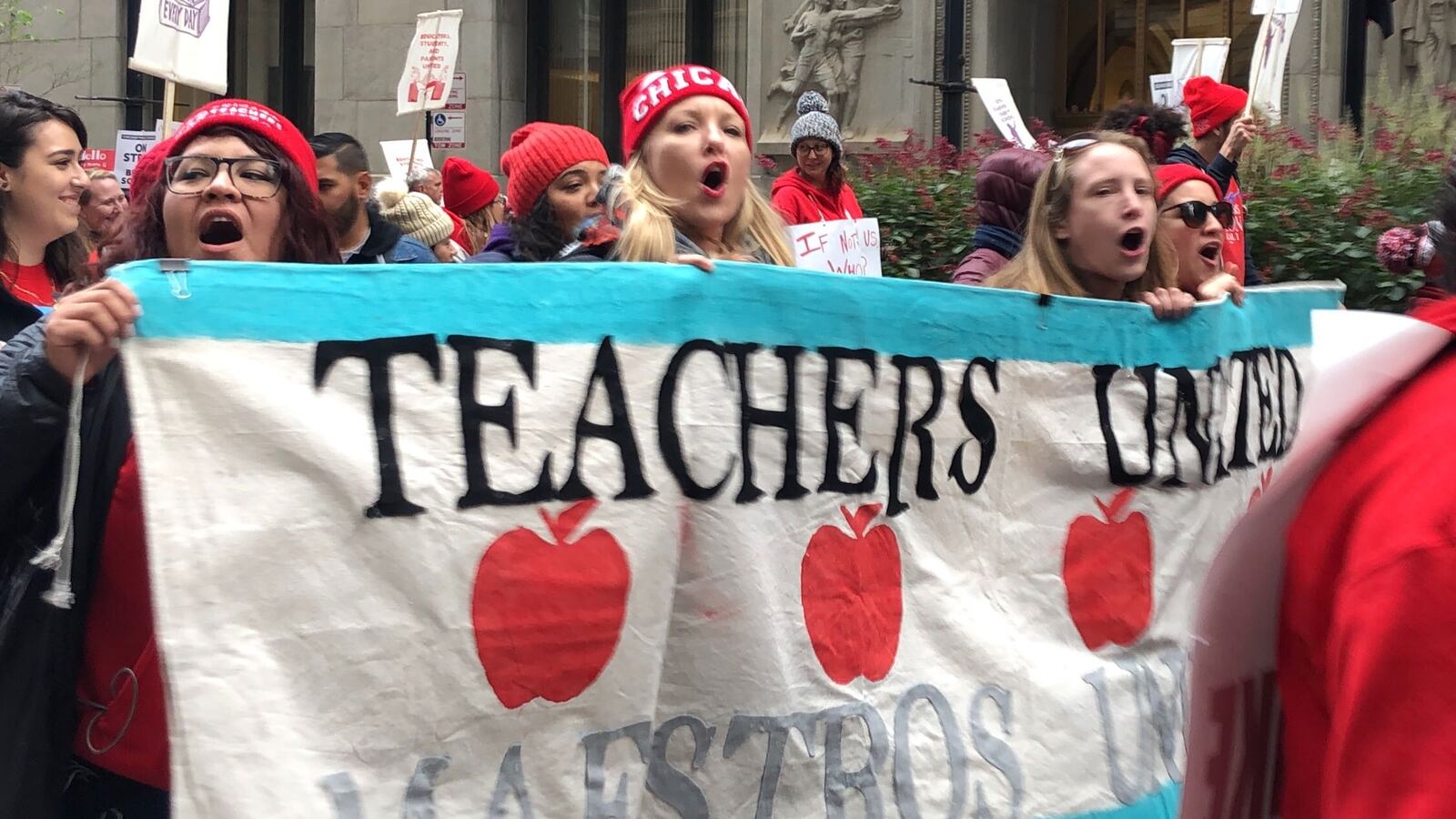Their feet hurt from days on the picket line, they worry about how their students are faring, and they’re apprehensive about a possibly prolonged dispute with Chicago Public Schools. But striking teachers say they back their union’s decision to hold out on core issues of class sizes and more staffing.
On Friday, the seventh day of the strike, picketing teachers took to the streets again in protest, and blocked traffic to demonstrate their insistence on winning contract demands.
“Civil disobedience is something that some are willing to do make sure we continue that fight to get a fair and just contract,” said Alyssa Rodriguez, a school social worker, who attended the march.
Related: The desolation of Chicago’s lowest-paid school aides
Rodriguez remained in the background Friday. A vanguard of Chicago Teachers Union volunteers risked arrest as they sought to shut down Lake Shore Drive.
Until Friday’s protest, the tempo of teacher picketing had slowed somewhat from before.
“It’s definitely a slower walking pace, but morale seems to still be hanging in there,” said Rodriguez, who works at Rodolfo Lozano Bilingual & International Center Elementary and Wilma Rudolph Learning Center. “People are still really just staying focused and grounded in everyone’s initial reasons and intentions to strike.”
Enthusiasm for the strike started off high last week, propelled by anger at the district and disgust with difficult teaching conditions.
When the strike began a week ago Thursday, Rodriguez said she was “super excited” to picket. That energy lasted through the weekend, as negotiators reported progress.
Rodriguez said she was spurred to strike because her caseload, split between two schools, at times felt impossible. “Listen, I am good, but I am not God,” she joked. “Plan your crisis accordingly, because I am only in the building on Monday, Wednesday and Friday.”
Then on Monday, negotiations stalled after the mayor said the city could not commit any more funds and bluntly suggested teachers return to their classrooms while negotiations continued. For some strikers, it felt like a slap in the face.
“Lightfoot has basically gotten to a point where she has told us there is no more money, stop negotiating, just go back to work. That to me is really disrespectful and really demeaning,” said Lorena Jimenez, a special education teacher at Piccolo School of Excellence, an elementary in Humboldt Park.
That’s kept her coming back to protests. “My morale is pretty low. I feel a bit defeated, but I am still going to keep coming back each day,” Jimenez said.
Jimenez wants to see better support for parents, like translation services during special education meetings when parents are expected to understand complicated legal documents related to their child’s education services, and lower class sizes so teachers can better assess and help students.
Still, she has concerns about the strike. “It’s so many days outside of the classroom. I’m worried about the kids, I’m worried about myself, I’m worried about budgeting,” Jimenez said. She hopes the strike will change working conditions. “Once we are back in the classroom I’ll have all the energy I need.”
But energy doesn’t replace a paycheck. Teachers will miss more than a week’s pay, and if the strike lasts another week, Chicago Public Schools could stop paying teachers’ health insurance premiums on Nov. 1.
Teachers say public support has been important to keeping their spirits up. Students have held rallies to back the strikers, educators around the country have worn red to show their support, and a slew of presidential candidates have expressed their support for strikers, including Sen. Elizabeth Warren, who rallied with teachers earlier this week.
But most of all, teachers have helped keep each other’s spirits up on the picket line.
Mel Ferrand, a first grade teacher at Ellington Elementary on the West Side, used to be the school librarian but lost the position during budget cuts. Now, thousands of books she used to help children check out are behind a locked door.
During the strike, Ferrand has been double-checking her supply of wool socks to stay warm and dry. She’s also appreciated the gestures of support, like an unfamiliar teacher helping her put her hood on when she struggled with it one day. “It may sound small, but it really helps show how we do care for each other,” Ferrand said. “It’s just how teachers and support staff are. We care for each other.”

